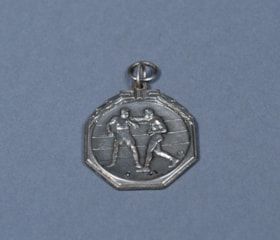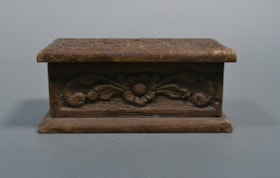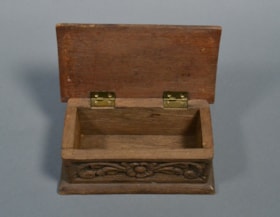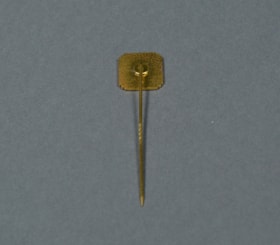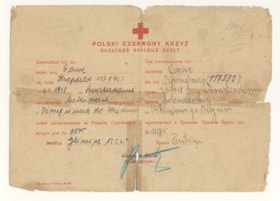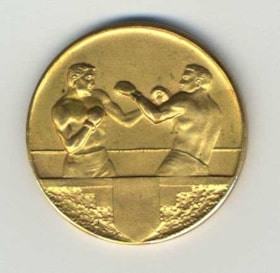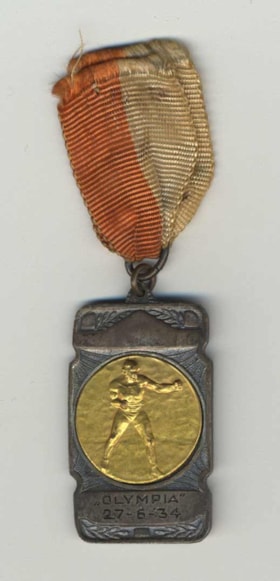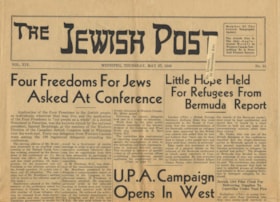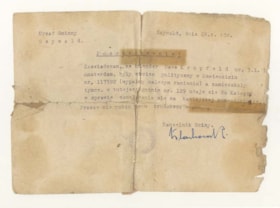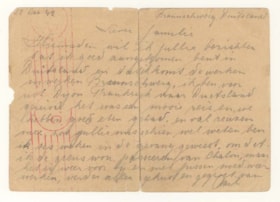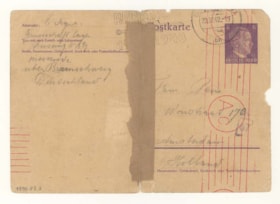Narrow Results By
Collection
- Allan Raymond Collection 6
- CONGREGATION SHAAR HASHOMAYIM MUSEUM AND ARCHIVES 1
- Canadian Jewish Congress organizational records 233
- Canadian Jewish Military Casualties 28
- David Cohen Family Fonds 3
- HEBREW SICK BENEFIT ASSOCIATION 66
- Hebrew Sick Benefit Association Membership Form 66
- JEWISH COLONIZATION ASSOCIATION (JCA or ICA) 391
- JEWISH IMMIGRANT AID SERVICES (JIAS) 1380
- JIAS Montreal Client Cards 516
- JIAS Montreal Immigrant Case Files 1922-1951 864
- Jacob Zipper Collection 1
Name
- 1st - Goldie Fine, 2nd - Susan Isaacs 1
- 1 brother 1
- 1 brother, 2 sisters 1
- 1 brother - Arron, 3 sisters - Evelyn Wiggins, Betty Troberman, Dorothy Tomakin 1
- 1 brother, four sisters 1
- 1 brother - Harry, 3 sisters - Ethel Sharp, Teresa Calp, Aida Fritz 1
- 1 brother - Israel W., 3 sisters - Mrs. Leon Schecter, Mrs. Max Zibman, Mrs. A. Budovitch 1
- 1 brother - Lawrence, 1 sister - Gladys Davis 1
- 1 brother - Louis, 2 sisters - Mrs. A. Fine, Mrs. H. Selick 1
- 1 brother - Nathan 1
- 1 brother - Nathan Hart 1
- 1 brother - Noah, 3 sisters - Leah, Rose, Fannie 1
Place
- Adegem Canadian War Cemetery 1
- Alsask North West, Saskatchewan 2
- Amherst, N.S. 1
- Amsterdam, Netherlands, Europe 11
- Anvers, Belgium, Europe 1
- Austria 10
- Bayeux Memorial 1
- Bender Hamlet, Manitoba 6
- Beny-sur-Mer Canadian War Cemetery, Reviers 2
- Berditchev, Ukraine 1
- Berlin, Germany, Europe 1
- Bessarabian Cemetery 1
Subject
- Abelson, David 1
- Ain, Joseph. 1
- Architectural models. 1
- Ariel BEN DAVID 1
- Art. 3
- Athanase DAVID 1
- Awards. 7
- Bar-Ilan University [Ramat Gan, Israel] -- Friends. 2
- Barkoff, Edward. 2
- Batshaw Youth and Family Centres = Les Centres de la jeunesse et de la famille Batshaw 1
- Becker, Lavy M., 1905-2001. 1
- Berenbaum, Samuel. 1
Medal
https://www.cjhn.ca/link/cjhn45880
- Collection
- Montreal Holocaust Museum
- Description Level
- Item
- Material Type
- object
- Physical Description
- Medal : moulded, stamped, embossed, engraved : grey, silver
- Date
- August 15, 1934
- Collection
- Montreal Holocaust Museum
- Description Level
- Item
- Material Type
- object
- Physical Description
- Medal : moulded, stamped, embossed, engraved : grey, silver
- Other Title Information
- Personal Symbol
- Date
- August 15, 1934
- Physical Condition
- Good
- Notes
- Apple shaped medal from the Olympia Club. Side and the top edges are smooth; the bottom edge is following the shape of the wreath and bow that is embossed on the surface. The centre of the medal has a raised circle, in a dotted border and the image of a man flexing his arms in the centre. There are two curlicues following the side edges, curling at the top on either side. Attached at the top centre is a round metak sphere with a hole in the middle, with a metak ring going through. Smooth back with inscription. Boxing medal from the Olympia sporting club Narrative: Medal was won by donor, David Kropveld. David Kropveld was born on January 3, 1918, in Amsterdam, Holland. David took up boxing as a young man and participated in competitions. In July 1940, David and his father joined the White Brigade resistence group in the south of France. As members of the White Brigade, David and his father gave up their Jewish identities. In October 1942, David was arrested while smuggling war-related information between occupied and Vichy France. He was tortured for ten days before being released. He was reunited with his father in Brussels, but the two were arrested by Gestapo officers one week later. They were incarcerated for three months and deported to Auschwitz concentration camp (Poland). Father and son wore the badges of political prisoners and were selected for the slave labour camp of Monowitz, where they stayed for about five days prior to being transferred to camp of Treblinka (Poland). In Treblinka, David witnessed his father’s murder at the hands of a guard. In the fall of 1944, a guard recognized David as a boxer he had admired and had him transferred back to Auschwitz and Monowitz in December 1944 to compete boxing matches against other prisoners. In December 1944, David managed to escape the death march with a few iother prisoners. He was rescued shortly after and brought to a hospital until his health improved. No members of his family survived the war. In the summer of 1945, David met his wife. In 1947, the couple emigrated to Cuba, and in 1950, to Montreal where David began a successful career as a butcher.
- Accession No.
- 1990.83.19
- Name Access
- Kropveld, David
- Places
- Charleroi ?, Belgium, Europe
- Archival / Genealogical
- Archival Descriptions
- Repository
- Montreal Holocaust Museum
Images
Medal
https://www.cjhn.ca/link/cjhn45881
- Collection
- Montreal Holocaust Museum
- Description Level
- Item
- Material Type
- object
- Physical Description
- Medal : moulded, stamped, embossed, engraved : gold
- Date
- 1936
- Collection
- Montreal Holocaust Museum
- Description Level
- Item
- Material Type
- object
- Physical Description
- Medal : moulded, stamped, embossed, engraved : gold
- Other Title Information
- Personal Symbol
- Date
- 1936
- Physical Condition
- Good
- Notes
- Cross-shaped medal from the Olympia boxing club, with a circle in the centre and coming out if the cross arms. The centre circle has an image of two men boxing. An eye is attached to the top arm of the cross, centre with a metal ring going through. The back is smooth and has an inscription. Narrative: Medal was won by donor, David Kropveld. David Kropveld was born on January 3, 1918, in Amsterdam, Holland. David took up boxing as a young man and participated in competitions. In July 1940, David and his father joined the White Brigade resistence group in the south of France. As members of the White Brigade, David and his father gave up their Jewish identities. In October 1942, David was arrested while smuggling war-related information between occupied and Vichy France. He was tortured for ten days before being released. He was reunited with his father in Brussels, but the two were arrested by Gestapo officers one week later. They were incarcerated for three months and deported to Auschwitz concentration camp (Poland). Father and son wore the badges of political prisoners and were selected for the slave labour camp of Monowitz, where they stayed for about five days prior to being transferred to camp of Treblinka (Poland). In Treblinka, David witnessed his father’s murder at the hands of a guard. In the fall of 1944, a guard recognized David as a boxer he had admired and had him transferred back to Auschwitz and Monowitz in December 1944 to compete boxing matches against other prisoners. In December 1944, David managed to escape the death march with a few iother prisoners. He was rescued shortly after and brought to a hospital until his health improved. No members of his family survived the war. In the summer of 1945, David met his wife. In 1947, the couple emigrated to Cuba, and in 1950, to Montreal where David began a successful career as a butcher.
- Accession No.
- 1990.83.25
- Name Access
- Kropveld, David
- Places
- Charleroi ?, Belgium, Europe
- Archival / Genealogical
- Archival Descriptions
- Repository
- Montreal Holocaust Museum
Images
Medal
https://www.cjhn.ca/link/cjhn45882
- Collection
- Montreal Holocaust Museum
- Description Level
- Item
- Material Type
- object
- Physical Description
- Medal : moulded, stamped, embossed, engraved : silver
- Date
- 1941
- Collection
- Montreal Holocaust Museum
- Description Level
- Item
- Material Type
- object
- Physical Description
- Medal : moulded, stamped, embossed, engraved : silver
- Other Title Information
- Personal Symbol
- Date
- 1941
- Physical Condition
- Good
- Notes
- Octogonal shaped medal from the Olympia boxing club. Upper side edges have been cut like a wreath; other edges have a thin border. There is a raised circle just inside the octagon wit han image of a two men boxing on a ring in the centre. Attached to top edge is a square eye with hole in the middle. an oval link is passing through with another ring going through the link. Narrative: Medal was won by donor, David Kropveld. David Kropveld was born on January 3, 1918, in Amsterdam, Holland. David took up boxing as a young man and participated in competitions. In July 1940, David and his father joined the White Brigade resistence group in the south of France. As members of the White Brigade, David and his father gave up their Jewish identities. In October 1942, David was arrested while smuggling war-related information between occupied and Vichy France. He was tortured for ten days before being released. He was reunited with his father in Brussels, but the two were arrested by Gestapo officers one week later. They were incarcerated for three months and deported to Auschwitz concentration camp (Poland). Father and son wore the badges of political prisoners and were selected for the slave labour camp of Monowitz, where they stayed for about five days prior to being transferred to camp of Treblinka (Poland). In Treblinka, David witnessed his father’s murder at the hands of a guard. In the fall of 1944, a guard recognized David as a boxer he had admired and had him transferred back to Auschwitz and Monowitz in December 1944 to compete boxing matches against other prisoners. In December 1944, David managed to escape the death march with a few iother prisoners. He was rescued shortly after and brought to a hospital until his health improved. No members of his family survived the war. In the summer of 1945, David met his wife. In 1947, the couple emigrated to Cuba, and in 1950, to Montreal where David began a successful career as a butcher.
- Accession No.
- 1990.83.27
- Name Access
- Kropveld, David
- Places
- Charleroi ?, Belgium, Europe
- Archival / Genealogical
- Archival Descriptions
- Repository
- Montreal Holocaust Museum
Images
Box
https://www.cjhn.ca/link/cjhn47411
- Collection
- Montreal Holocaust Museum
- Description Level
- Item
- Material Type
- object
- Physical Description
- Box : carved, hinged : brown, brass ; Ht: 6,5 cm x W: 8,1 cm x De: 14,2 cm
- Collection
- Montreal Holocaust Museum
- Description Level
- Item
- Material Type
- object
- Physical Description
- Box : carved, hinged : brown, brass ; Ht: 6,5 cm x W: 8,1 cm x De: 14,2 cm
- Other Title Information
- Container
- Physical Condition
- Excellent
- Notes
- Wooden box with high-relief floral designs on each side and a filligree leaf design on the lid. Lid is attached to the base with 2 hinges. Narrative: The box was made by donor, David Kropveld, in woodworking class pre-war Amsterdam. David Kropveld was born in 1918 in Amsterdam. The university he was to attend was shut down by the Germans in 1940. In July 1940, David and his father joined the White Brigade resistence group in the south of France. As members of the White Brigade, David and his father gave up their Jewish identities. In October 1942, David was arrested while smuggling war-related information between occupied and Vichy France. He was tortured for ten days before being released. He was reunited with his father in Brussels, but the two were arrested by Gestapo officers one week later. They were incarcerated for three months and deported to Auschwitz concentration camp (Poland). Father and son wore the badges of political prisoners and were selected for the slave labour camp of Monowitz, where they stayed for about five days prior to being transferred to camp of Treblinka (Poland). In Treblinka, David witnessed his father’s murder at the hands of a guard. In the fall of 1944, a guard recognized David as a boxer he had admired and had him transferred back to Auschwitz and Monowitz in December 1944 to compete boxing matches against other prisoners. In December 1944, David managed to escape the death march with a few iother prisoners. He was rescued shortly after and brought to a hospital until his health improved. No members of his family survived the war. In the summer of 1945, David met his wife. In 1947, the couple emigrated to Cuba, and in 1950, to Montreal where David began a successful career as a butcher. He immediately became involved in the underground in Holland, Belgium, and France. He was involved in transporting children to safe places. He participated in armed attacks of German convoys. He suffered two shootings and was arrested in France-subsequently sent to the camp of Breendock in Belgium and then to Treblinka, Sosnovitch, and Auschwitz. He was liberated by the Russian Amy.
- Accession No.
- 1990.83.29
- Name Access
- Kropveld, David
- Archival / Genealogical
- Archival Descriptions
- Repository
- Montreal Holocaust Museum
Images
Pin
https://www.cjhn.ca/link/cjhn47488
- Collection
- Montreal Holocaust Museum
- Description Level
- Item
- Material Type
- object
- Physical Description
- Pin : soldered, enamelled, inlaid, moulded, screwed, glued : gold, red, white, blue
- Collection
- Montreal Holocaust Museum
- Description Level
- Item
- Material Type
- object
- Physical Description
- Pin : soldered, enamelled, inlaid, moulded, screwed, glued : gold, red, white, blue
- Other Title Information
- Personal Symbol
- Physical Condition
- Good
- Notes
- Boxing pin. Square base with saw-tooth cut corners and a thin gold border at each edge. The centre has been divided horizontally 3 times (red, white, blue). Inlaid in the red is gold text (see inscription); inlaid in between the white and blue stripes is a pair of gold boxing gloves. The reverse is textured with a long, stick pin extending downwards from the centre; the middle of the pin has screw-teeth. Narrative: Medal was won by donor, David Kropveld. David Kropveld was born on January 3, 1918, in Amsterdam, Holland. David took up boxing as a young man and participated in competitions. In July 1940, David and his father joined the White Brigade resistence group in the south of France. As members of the White Brigade, David and his father gave up their Jewish identities. In October 1942, David was arrested while smuggling war-related information between occupied and Vichy France. He was tortured for ten days before being released. He was reunited with his father in Brussels, but the two were arrested by Gestapo officers one week later. They were incarcerated for three months and deported to Auschwitz concentration camp (Poland). Father and son wore the badges of political prisoners and were selected for the slave labour camp of Monowitz, where they stayed for about five days prior to being transferred to camp of Treblinka (Poland). In Treblinka, David witnessed his father’s murder at the hands of a guard. In the fall of 1944, a guard recognized David as a boxer he had admired and had him transferred back to Auschwitz and Monowitz in December 1944 to compete boxing matches against other prisoners. In December 1944, David managed to escape the death march with a few iother prisoners. He was rescued shortly after and brought to a hospital until his health improved. No members of his family survived the war. In the summer of 1945, David met his wife. In 1947, the couple emigrated to Cuba, and in 1950, to Montreal where David began a successful career as a butcher.
- Accession No.
- 1990.99.02
- Name Access
- Kropveld, David
- Archival / Genealogical
- Archival Descriptions
- Repository
- Montreal Holocaust Museum
Images
Plaque
https://www.cjhn.ca/link/cjhn47615
- Collection
- Montreal Holocaust Museum
- Description Level
- Item
- Material Type
- object
- Physical Description
- Plaque : cut, screwed, printed, burnt : brown, yellow, black, brass
- Date
- May 1975
- Collection
- Montreal Holocaust Museum
- Description Level
- Item
- Material Type
- object
- Physical Description
- Plaque : cut, screwed, printed, burnt : brown, yellow, black, brass
- Other Title Information
- Ceremonial Artifact
- Date
- May 1975
- Physical Condition
- Excellent
- Language
- English
- French
- Notes
- Glazed wood back with a saw-tooth edge. In the centre is a yellow and black paper, with burnt waved edge (backed with a brown paper, with burnt waved edges) with a lined map of concentraction camps on on the top left, b&w photos of camp prisoners on the bottom left; the title on the top right and a Star of David, made of barbed wire. The paper is covered with plexi glass, and screwed on at each corner. Under the plexi is a metal plaque - see inscription. Attached to each top corner is a chain, used to hang the plaque. Narrative: This plaque was given by the Association of Survivors of Nazi Oppression to Alan Rose, liberator
- Accession No.
- 2000.68.01
- Name Access
- Millstein, David
- Archival / Genealogical
- Archival Descriptions
- Repository
- Montreal Holocaust Museum
Images
Manuscript
https://www.cjhn.ca/link/cjhn48060
- Collection
- Montreal Holocaust Museum
- Description Level
- Item
- Material Type
- textual record
- Physical Description
- Manuscript : printed, bound : black, beige ; Ht: 35,8 cm x W: 21,8 cm
- Date
- 1943
- Collection
- Montreal Holocaust Museum
- Description Level
- Item
- Material Type
- textual record
- Physical Description
- Manuscript : printed, bound : black, beige ; Ht: 35,8 cm x W: 21,8 cm
- Other Title Information
- Documentary Artifact
- Date
- 1943
- Physical Condition
- Good
- Language
- Hebrew
- Notes
- 13 pages. No cover, bound with staples. Beige pages, typewritten, single-sided, photocopied. Narrative: Frances Rubinlicht's last will and testament; signed by Henry Rubinlicht. Frances died a few days before it was completed. Written in a bunker.
- Accession No.
- 2000.42.02
- Name Access
- Augenfeld, David
- Places
- Warsaw ?, Poland ?, Europe ?
- Archival / Genealogical
- Archival Descriptions
- Repository
- Montreal Holocaust Museum
Spoon
https://www.cjhn.ca/link/cjhn48156
- Collection
- Montreal Holocaust Museum
- Description Level
- Item
- Material Type
- object
- Physical Description
- Spoon : cast (moulded), silver plated, engraved ; Ht: 4 cm x W: 4,5 cm x De: 21,5 cm
- Collection
- Montreal Holocaust Museum
- Description Level
- Item
- Material Type
- object
- Physical Description
- Spoon : cast (moulded), silver plated, engraved ; Ht: 4 cm x W: 4,5 cm x De: 21,5 cm
- Other Title Information
- Food Service T&E
- Physical Condition
- Good
- Notes
- Table spoon size; oblong bowl extending from a thin, slightly curved handle. The bottom of the handle tapers out and rounds like a tear-drop; there is a raised ridge running down the centre. On the reverse of the handle, at the bottom, is a Star of David. Narrative: B. Bohrmann was a well known, Jewish owned company for silverware products, situated in Frankfurt am Main (Germany). It was founded in 1865 by Bernhard Borhmann. The compagny produced cutlery and tableware, often for the use in hotels. Thus the cutlery in MHMC collection might very well come from a Jewish community center.
- Accession No.
- 2012.30.01-07
- Name Access
- STEIN, David
- Archival / Genealogical
- Archival Descriptions
- Repository
- Montreal Holocaust Museum
Images
Knife
https://www.cjhn.ca/link/cjhn48157
- Collection
- Montreal Holocaust Museum
- Description Level
- Item
- Material Type
- object
- Physical Description
- Knife : cast (moulded), silver plated, engraved
- Collection
- Montreal Holocaust Museum
- Description Level
- Item
- Material Type
- object
- Physical Description
- Knife : cast (moulded), silver plated, engraved
- Other Title Information
- Food Service T&E
- Physical Condition
- Good
- Notes
- Rounded blade, with a sharpened right edge, extending from an oblong, solid, handle; the blade extends slightly outwards where the edge meets the handle on the left side. The handle tapers slightly near the blade, with 2 beveled ridges. The bottom tulips out and rounds at the edge. On the reverse of the handle, at the bottom, is a Star of David. Narrative: B. Bohrmann was a well known, Jewish owned company for silverware products, situated in Frankfurt am Main (Germany). It was founded in 1865 by Bernhard Borhmann. The compagny produced cutlery and tableware, often for the use in hotels. Thus the cutlery in MHMC collection might very well come from a Jewish community center.
- Accession No.
- 2012.30.08-18
- Name Access
- STEIN, David
- Archival / Genealogical
- Archival Descriptions
- Repository
- Montreal Holocaust Museum
Images
Fork
https://www.cjhn.ca/link/cjhn48158
- Collection
- Montreal Holocaust Museum
- Description Level
- Item
- Material Type
- object
- Physical Description
- Fork : cast (moulded), silver plated, engraved : silver ; Ht: 2,5 cm x W: 2,8 cm x De: 21,5 cm
- Collection
- Montreal Holocaust Museum
- Description Level
- Item
- Material Type
- object
- Physical Description
- Fork : cast (moulded), silver plated, engraved : silver ; Ht: 2,5 cm x W: 2,8 cm x De: 21,5 cm
- Other Title Information
- Food Service T&E
- Physical Condition
- Good
- Notes
- 4 tines and a shallow tang extending from a thin, slightly curved handle. The bottom of the handle tapers out and rounds like a tear-drop; there is a raised ridge running down the centre. On the reverse of the handle, at the bottom, is a Star of David. Narrative: B. Bohrmann was a well known, Jewish owned company for silverware products, situated in Frankfurt am Main (Germany). It was founded in 1865 by Bernhard Borhmann. The compagny produced cutlery and tableware, often for the use in hotels. Thus the cutlery in MHMC collection might very well come from a Jewish community center.
- Accession No.
- 2012.30.19-33
- Name Access
- STEIN, David
- Archival / Genealogical
- Archival Descriptions
- Repository
- Montreal Holocaust Museum
Images
Identification card
https://www.cjhn.ca/link/cjhn50267
- Collection
- Montreal Holocaust Museum
- Description Level
- Item
- Material Type
- textual record
- Physical Description
- Identification card : Paper : Black, White, Red ; Ht: 4 in. x W: 3 in.
- Date
- August 27, 1941
- Collection
- Montreal Holocaust Museum
- Description Level
- Item
- Material Type
- textual record
- Physical Description
- Identification card : Paper : Black, White, Red ; Ht: 4 in. x W: 3 in.
- Other Title Information
- Documentary Artifact
- Date
- August 27, 1941
- Physical Condition
- Good
- Language
- Dutch
- Notes
- Two sided, with two vertical folds. The front has a photograph of David Kropveld, as well as three stamps, one is a circular stamp with the Coat of arms of the republic of the United Netherlands in the middle. The back has two finger prints, as well as one circular stamp with the Coat of Arms of the Republic of the United Netherlands in the middle. Narrative: Identification Card used by David Kropveld while in Holland. David Kropveld was born on January 3, 1918, in Amsterdam, Holland. In July 1940, David and his father joined the White Brigade resistence group in the south of France. As members of the White Brigade, David and his father gave up their Jewish identities. In October 1942, David was arrested while smuggling war-related information between occupied and Vichy France. He was tortured for ten days before being released. He was reunited with his father in Brussels, but the two were arrested by Gestapo officers one week later. They were incarcerated for three months and deported to Auschwitz concentration camp (Poland). Father and son wore the badges of political prisoners and were selected for the slave labour camp of Monowitz, where they stayed for about five days prior to being transferred to camp of Treblinka (Poland). In Treblinka, David witnessed his father’s murder at the hands of a guard. In the fall of 1944, a guard recognized David as a boxer he had admired and had him transferred back to Auschwitz and Monowitz in December 1944 to compete boxing matches against other prisoners. In December 1944, David managed to escape the death march with a few other prisoners. He was rescued shortly after and brought to a hospital until his health improved. No members of his family survived the war.
- Accession No.
- 1990.83.9
- Name Access
- Kropveld, David
- Archival / Genealogical
- Archival Descriptions
- Repository
- Montreal Holocaust Museum
Images
Certificate
https://www.cjhn.ca/link/cjhn50348
- Collection
- Montreal Holocaust Museum
- Description Level
- Item
- Material Type
- textual record
- Physical Description
- Certificate : Paper : Printed, handwritten : Ink : Beige, red, black, blue ; Ht: 14,5 cm x W: 20,5 cm
- Date
- May 15, 1945
- Collection
- Montreal Holocaust Museum
- Description Level
- Item
- Material Type
- textual record
- Physical Description
- Certificate : Paper : Printed, handwritten : Ink : Beige, red, black, blue ; Ht: 14,5 cm x W: 20,5 cm
- Other Title Information
- Documentary Artifact
- Date
- May 15, 1945
- Physical Condition
- Good
- Language
- Czech
- Russian
- Notes
- Single-sided printed page with stamp and handwritten note on back, creased horizontally and vertically, repaired with tape. Polish Red Cross certificate for David Kropveld issued for identification. Narrative: David Kropveld was born on 1918/1/3 in Amsterdam, Holland. He was the third child of Samuel Kropveld (1884/3/?) and Goedge Van Cleef (1894). His father had studied to be a doctor before he was enlisted in 1916. His mother was a nursery school teacher until her marriage. As a boy he participated in Boy Scouts, acrobatic and boxing training. He studied at a commercial college, and opened a silver, gold, and diamond business during the Great Depression. In 1936 he was chosen to represent Holland as a boxer in the Olympics, but he chose not to go. He trained as a naval officer, and was prepared to attend university when the Germans occupied Holland in May 1940. In July, David and his father joined the White Brigade resistance group in the south of France. As members, David and his father gave up their Jewish identities and were responsible for taking children to safe houses and participating in armed attacks on German convoys. During this time David used the alibis Charles Seegers and Dan Daladien. In October 1942, David was arrested while smuggling war-related information between occupied and Vichy France. He was tortured for ten days before escaping with the aid of two men from the resistance. He was reunited with his father in Brussels, but the two were arrested by Gestapo officers one week later. They were incarcerated for three months and deported to Auschwitz where they were considered political prisoners and were selected for the slave labor camp at Monowitz Camp. They remained there for 5 days prior to being transferred to Treblinka Camp. In Treblinka, David witnessed his father’s murder at the hands of a guard. During this time Goedge had been sent to Sobibor where she was gassed and cremated on 1943/5/7. In the fall of 1944, a guard recognized David as a boxer he admired and had him transferred back to Auschwitz and on to Monowitz in December 1944 to compete in boxing matches against other prisoners. The rest of David’s family was killed during the war. Of his siblings Gretha (1914) died of hunger in Malapane, Poland with her husband in September 1942, Hartog (1916) was injured as a sergeant in the army and executed after his capture on 1943/6/30, Rosette (June 1922) was gassed in Sobibor on 1943/7/23 while pregnant, and Israel (March 1924) was beaten to death during a protest on a transport bound for Buchenwald. In December 1944, David managed to escape the death march with a few other prisoners. He was rescued shortly after and brought to a hospital until his health improved, although he never fully recovered and spent most of his life physically handicapped. In the summer of 1945, David met his wife, Annie Cohen. They had two sons, Mike and Phillip Kropveld. In 1947, the couple immigrated to Cuba, and then, in 1950, to Montreal, Canada, where David began a successful career as a butcher. He died in Montreal on 2008/11/26 at the age of 91.
- Accession No.
- 1990.83.2
- Name Access
- Kropveld, David
- Places
- Gliwice, Poland, Europe
- Archival / Genealogical
- Archival Descriptions
- Repository
- Montreal Holocaust Museum
Images
Medal
https://www.cjhn.ca/link/cjhn50349
- Collection
- Montreal Holocaust Museum
- Description Level
- Item
- Material Type
- object
- Physical Description
- Medal : Cast : Yellow, Brown ; Ht: 3 in. x W: 1,25 in.
- Date
- February 27, 1935
- Collection
- Montreal Holocaust Museum
- Description Level
- Item
- Material Type
- object
- Physical Description
- Medal : Cast : Yellow, Brown ; Ht: 3 in. x W: 1,25 in.
- Other Title Information
- Personal Symbol
- Date
- February 27, 1935
- Physical Condition
- Good
- Notes
- Circular with an illustration of two men boxing in the middle, and raised leaves along the bottom. There is a loop on the top with a piece of fabric stretched through it. Medal from the Olympia boxing club Narrative: Medal was won by donor, David Kropveld. David Kropveld was born on January 3, 1918, in Amsterdam, Holland. David took up boxing as a young man and participated in competitions. In the fall of 1944, a guard recognized David as a boxer he had admired and had him transferred back to Auschwitz and Monowitz in December 1944 to compete boxing matches against other prisoners. In December 1944, David managed to escape the death march with a few iother prisoners. He was rescued shortly after and brought to a hospital until his health improved. No members of his family survived the war. In the summer of 1945, David met his wife. In 1947, the couple emigrated to Cuba, and in 1950, to Montreal where David began a successful career as a butcher.
- Accession No.
- 1990.83.21
- Name Access
- Kropveld, David
- Archival / Genealogical
- Archival Descriptions
- Repository
- Montreal Holocaust Museum
Images
Medal
https://www.cjhn.ca/link/cjhn50350
- Collection
- Montreal Holocaust Museum
- Description Level
- Item
- Material Type
- object
- Physical Description
- Medal : Cast : Red, Brown, Bronze ; Ht: 2,5 in. x W: 1 in.
- Date
- January 13, 1937
- Collection
- Montreal Holocaust Museum
- Description Level
- Item
- Material Type
- object
- Physical Description
- Medal : Cast : Red, Brown, Bronze ; Ht: 2,5 in. x W: 1 in.
- Other Title Information
- Personal Symbol
- Date
- January 13, 1937
- Physical Condition
- Good
- Notes
- Circular with raised edges and an illustration of two men boxing in the middle. There is a loop on the top with a piece of fabric stretched through it. Medal from the Olympia boxing club Narrative: Medal was won by donor, David Kropveld. David Kropveld was born on January 3, 1918, in Amsterdam, Holland. David took up boxing as a young man and participated in competitions. In the fall of 1944, a guard recognized David as a boxer he had admired and had him transferred back to Auschwitz and Monowitz in December 1944 to compete boxing matches against other prisoners. In December 1944, David managed to escape the death march with a few other prisoners. He was rescued shortly after and brought to a hospital until his health improved. No members of his family survived the war. In the summer of 1945, David met his wife. In 1947, the couple emigrated to Cuba, and in 1950, to Montreal where David began a successful career as a butcher.
- Accession No.
- 1990.83.22
- Name Access
- Kropveld, David
- Archival / Genealogical
- Archival Descriptions
- Repository
- Montreal Holocaust Museum
Images
Medal
https://www.cjhn.ca/link/cjhn50351
- Collection
- Montreal Holocaust Museum
- Description Level
- Item
- Material Type
- object
- Physical Description
- Medal : Cast : Yellow, Red, White, Blue ; Ht: 1,25 in. x W: 1,25 in.
- Date
- May 16, 1938
- Collection
- Montreal Holocaust Museum
- Description Level
- Item
- Material Type
- object
- Physical Description
- Medal : Cast : Yellow, Red, White, Blue ; Ht: 1,25 in. x W: 1,25 in.
- Other Title Information
- Personal Symbol
- Date
- May 16, 1938
- Physical Condition
- Good
- Language
- English
- Notes
- Circular with raised edges as well as an illustration of two men boxing in the middle. On there are 2 flags crossed on the back, France and Holland, and a crest along the bottom. The medal from the Olympia boxing club. Narrative: Medal was won by donor, David Kropveld. David Kropveld was born on January 3, 1918, in Amsterdam, Holland. David took up boxing as a young man and participated in competitions. In the fall of 1944, a guard recognized David as a boxer he had admired and had him transferred back to Auschwitz and Monowitz in December 1944 to compete boxing matches against other prisoners. In December 1944, David managed to escape the death march with a few iother prisoners. He was rescued shortly after and brought to a hospital until his health improved. No members of his family survived the war. In the summer of 1945, David met his wife. In 1947, the couple emigrated to Cuba, and in 1950, to Montreal where David began a successful career as a butcher.
- Accession No.
- 1990.83.23
- Name Access
- Kropveld, David
- Archival / Genealogical
- Archival Descriptions
- Repository
- Montreal Holocaust Museum
Images
Medal
https://www.cjhn.ca/link/cjhn50352
- Collection
- Montreal Holocaust Museum
- Description Level
- Item
- Material Type
- object
- Physical Description
- Medal : Cast : Red, Black, Gold ; Ht: 2,75 in. x W: 1 in.
- Date
- February 29, 1940
- Collection
- Montreal Holocaust Museum
- Description Level
- Item
- Material Type
- object
- Physical Description
- Medal : Cast : Red, Black, Gold ; Ht: 2,75 in. x W: 1 in.
- Other Title Information
- Personal Symbol
- Date
- February 29, 1940
- Physical Condition
- Good
- Notes
- Circular with raised edges, and an illustration of four people swimming in the middle. On the back there is a crest along the bottom which has vines on either side. A swimming medal from the Olympia boxing club Narrative: Medal was won by donor, David Kropveld. David Kropveld was born on January 3, 1918, in Amsterdam, Holland. David took up boxing as a young man and participated in competitions. In the fall of 1944, a guard recognized David as a boxer he had admired and had him transferred back to Auschwitz and Monowitz in December 1944 to compete boxing matches against other prisoners. In December 1944, David managed to escape the death march with a few iother prisoners. He was rescued shortly after and brought to a hospital until his health improved. No members of his family survived the war. In the summer of 1945, David met his wife. In 1947, the couple emigrated to Cuba, and in 1950, to Montreal where David began a successful career as a butcher.
- Accession No.
- 1990.83.28
- Name Access
- Kropveld, David
- Archival / Genealogical
- Archival Descriptions
- Repository
- Montreal Holocaust Museum
Images
Medal
https://www.cjhn.ca/link/cjhn51192
- Collection
- Montreal Holocaust Museum
- Description Level
- Item
- Material Type
- object
- Physical Description
- Medal : Cast : Red, White, Grey, Gold ; Ht: 3 in. x W: 1 in.
- Date
- June 27, 1934
- Collection
- Montreal Holocaust Museum
- Description Level
- Item
- Material Type
- object
- Physical Description
- Medal : Cast : Red, White, Grey, Gold ; Ht: 3 in. x W: 1 in.
- Other Title Information
- Personal Symbol
- Date
- June 27, 1934
- Physical Condition
- Good
- Notes
- Rectangular, with a circular raised illustration of a man boxing in the middle. On the top is a loop with a piece of fabric stretched through it. Boxing medal from the Olympia boxing club Narrative: Medal was won by donor, David Kropveld. David Kropveld was born on January 3, 1918, in Amsterdam, Holland. David took up boxing as a young man and participated in competitions. In July 1940, David and his father joined the White Brigade resistence group in the south of France. As members of the White Brigade, David and his father gave up their Jewish identities. In October 1942, David was arrested while smuggling war-related information between occupied and Vichy France. He was tortured for ten days before being released. He was reunited with his father in Brussels, but the two were arrested by Gestapo officers one week later. They were incarcerated for three months and deported to Auschwitz concentration camp (Poland). Father and son wore the badges of political prisoners and were selected for the slave labour camp of Monowitz, where they stayed for about five days prior to being transferred to camp of Treblinka (Poland). In Treblinka, David witnessed his father’s murder at the hands of a guard. In the fall of 1944, a guard recognized David as a boxer he had admired and had him transferred back to Auschwitz and Monowitz in December 1944 to compete boxing matches against other prisoners. In December 1944, David managed to escape the death march with a few iother prisoners. He was rescued shortly after and brought to a hospital until his health improved. No members of his family survived the war. In the summer of 1945, David met his wife. In 1947, the couple emigrated to Cuba, and in 1950, to Montreal where David began a successful career as a butcher.
- Accession No.
- 1990.83.26
- Name Access
- Kropveld, David
- Archival / Genealogical
- Archival Descriptions
- Repository
- Montreal Holocaust Museum
Images
The Jewish Post
https://www.cjhn.ca/link/cjhn51193
- Collection
- Montreal Holocaust Museum
- Description Level
- Item
- Material Type
- textual record
- Physical Description
- Newspaper : Paper : Printed : Ink : Black, White ; Ht: 15 in. x W: 11,25 in.
- Date
- May 27, 1943
- Collection
- Montreal Holocaust Museum
- Description Level
- Item
- Material Type
- textual record
- Physical Description
- Newspaper : Paper : Printed : Ink : Black, White ; Ht: 15 in. x W: 11,25 in.
- Other Title Information
- Documentary Artifact
- Date
- May 27, 1943
- Physical Condition
- Good
- Language
- English
- Notes
- Front page has an illustration of a man wearing a suit and tie. Articles relating the war and Jewish concerns. Includes article “Samuel Zygelbojm, Member Of Polish Council, Dies At 49”. Narrative: Szmul Zygielbojm (1895–1943) was a Jewish-Polish socialist politician, leader of the Bund, and a member of the National Council of the Polish government in exile. He committed suicide to protest the indifference of the Allied governments to the Holocaust.
- Accession No.
- 2011X.223.01
- Name Access
- Lithwick, David
- Archival / Genealogical
- Archival Descriptions
- Repository
- Montreal Holocaust Museum
Images
Certificate
https://www.cjhn.ca/link/cjhn59786
- Collection
- Montreal Holocaust Museum
- Description Level
- Item
- Material Type
- textual record
- Physical Description
- Certificate : Paper : Typewritten : Ink : Beige, black, brown, blue ; Ht: 15 cm x W: 20 cm
- Date
- April 28, 1945
- Collection
- Montreal Holocaust Museum
- Description Level
- Item
- Material Type
- textual record
- Physical Description
- Certificate : Paper : Typewritten : Ink : Beige, black, brown, blue ; Ht: 15 cm x W: 20 cm
- Other Title Information
- Documentary Artifact
- Date
- April 28, 1945
- Physical Condition
- Good
- Language
- Polish
- Notes
- Single-sided page, creased once horizontally and vertically, tears along creases repaired with tape, discolouration where tape fell off front. Certificate for David Kropveld confirming that he was a political prisoner and suffered from an injury in his shoulder. Likely from when he was almost shot in the heart. Narrative: David Kropveld was born on 1918/1/3 in Amsterdam, Holland. He was the third child of Samuel Kropveld (1884/3/?) and Goedge Van Cleef (1894). His father had studied to be a doctor before he was enlisted in 1916. His mother was a nursery school teacher until her marriage. As a boy he participated in Boy Scouts, acrobatic and boxing training. He studied at a commercial college, and opened a silver, gold, and diamond business during the Great Depression. In 1936 he was chosen to represent Holland as a boxer in the Olympics, but he chose not to go. He trained as a naval officer, and was prepared to attend university when the Germans occupied Holland in May 1940. In July, David and his father joined the White Brigade resistance group in the south of France. As members, David and his father gave up their Jewish identities and were responsible for taking children to safe houses and participating in armed attacks on German convoys. During this time David used the alibis Charles Seegers and Dan Daladien. In October 1942, David was arrested while smuggling war-related information between occupied and Vichy France. He was tortured for ten days before escaping with the aid of two men from the resistance. He was reunited with his father in Brussels, but the two were arrested by Gestapo officers one week later. They were incarcerated for three months and deported to Auschwitz where they were considered political prisoners and were selected for the slave labor camp at Monowitz Camp. They remained there for 5 days prior to being transferred to Treblinka Camp. In Treblinka, David witnessed his father’s murder at the hands of a guard. During this time Goedge had been sent to Sobibor where she was gassed and cremated on 1943/5/7. In the fall of 1944, a guard recognized David as a boxer he admired and had him transferred back to Auschwitz and on to Monowitz in December 1944 to compete in boxing matches against other prisoners. The rest of David’s family was killed during the war. Of his siblings Gretha (1914) died of hunger in Malapane, Poland with her husband in September 1942, Hartog (1916) was injured as a sergeant in the army and executed after his capture on 1943/6/30, Rosette (June 1922) was gassed in Sobibor on 1943/7/23 while pregnant, and Israel (March 1924) was beaten to death during a protest on a transport bound for Buchenwald. In December 1944, David managed to escape the death march with a few other prisoners. He was rescued shortly after and brought to a hospital until his health improved, although he never fully recovered and spent most of his life physically handicapped. In the summer of 1945, David met his wife, Annie Cohen. They had two sons, Mike and Phillip Kropveld. In 1947, the couple immigrated to Cuba, and then, in 1950, to Montreal, Canada, where David began a successful career as a butcher. He died in Montreal on 2008/11/26 at the age of 91.
- Accession No.
- 1990.83.10
- Name Access
- Kropveld, David
- Places
- Szynwald, Poland, Europe
- Archival / Genealogical
- Archival Descriptions
- Repository
- Montreal Holocaust Museum
Images
Postcard
https://www.cjhn.ca/link/cjhn59787
- Collection
- Montreal Holocaust Museum
- Description Level
- Item
- Material Type
- textual record
- Physical Description
- Postcard : Cardstock : Handwritten : Pencil : Beige, purple, pink ; Ht: 10 cm x W: 15 cm
- Date
- December 22, 1942
- Collection
- Montreal Holocaust Museum
- Description Level
- Item
- Material Type
- textual record
- Physical Description
- Postcard : Cardstock : Handwritten : Pencil : Beige, purple, pink ; Ht: 10 cm x W: 15 cm
- Other Title Information
- Documentary Artifact
- Date
- December 22, 1942
- Physical Condition
- Good
- Language
- German
- Notes
- Postcard split in half along vertical crease, repaired with tape, Hitler stamp T.R. From A. Segis to Jam Pens (?) in Amsterdam, Holland. Narrative: David Kropveld was born on 1918/1/3 in Amsterdam, Holland. He was the third child of Samuel Kropveld (1884/3/?) and Goedge Van Cleef (1894). His father had studied to be a doctor before he was enlisted in 1916. His mother was a nursery school teacher until her marriage. As a boy he participated in Boy Scouts, acrobatic and boxing training. He studied at a commercial college, and opened a silver, gold, and diamond business during the Great Depression. In 1936 he was chosen to represent Holland as a boxer in the Olympics, but he chose not to go. He trained as a naval officer, and was prepared to attend university when the Germans occupied Holland in May 1940. In July, David and his father joined the White Brigade resistance group in the south of France. As members, David and his father gave up their Jewish identities and were responsible for taking children to safe houses and participating in armed attacks on German convoys. During this time David used the alibis Charles Seegers and Dan Daladien. In October 1942, David was arrested while smuggling war-related information between occupied and Vichy France. He was tortured for ten days before escaping with the aid of two men from the resistance. He was reunited with his father in Brussels, but the two were arrested by Gestapo officers one week later. They were incarcerated for three months and deported to Auschwitz where they were considered political prisoners and were selected for the slave labor camp at Monowitz Camp. They remained there for 5 days prior to being transferred to Treblinka Camp. In Treblinka, David witnessed his father’s murder at the hands of a guard. During this time Goedge had been sent to Sobibor where she was gassed and cremated on 1943/5/7. In the fall of 1944, a guard recognized David as a boxer he admired and had him transferred back to Auschwitz and on to Monowitz in December 1944 to compete in boxing matches against other prisoners. The rest of David’s family was killed during the war. Of his siblings Gretha (1914) died of hunger in Malapane, Poland with her husband in September 1942, Hartog (1916) was injured as a sergeant in the army and executed after his capture on 1943/6/30, Rosette (June 1922) was gassed in Sobibor on 1943/7/23 while pregnant, and Israel (March 1924) was beaten to death during a protest on a transport bound for Buchenwald. In December 1944, David managed to escape the death march with a few other prisoners. He was rescued shortly after and brought to a hospital until his health improved, although he never fully recovered and spent most of his life physically handicapped. In the summer of 1945, David met his wife, Annie Cohen. They had two sons, Mike and Phillip Kropveld. In 1947, the couple immigrated to Cuba, and then, in 1950, to Montreal, Canada, where David began a successful career as a butcher. He died in Montreal on 2008/11/26 at the age of 91.
- Accession No.
- 1990.83.3
- Name Access
- Kropveld, David
- Archival / Genealogical
- Archival Descriptions
- Repository
- Montreal Holocaust Museum
Images
{{ server.message }}





